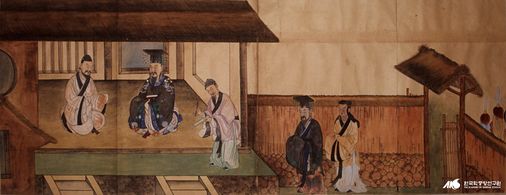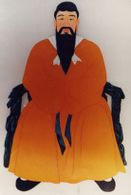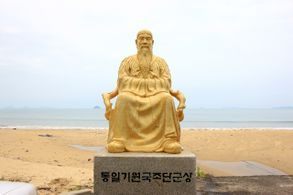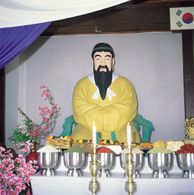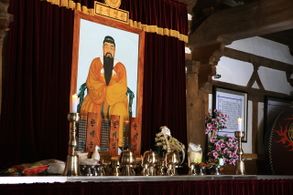"고조선"의 두 판 사이의 차이
Korea100
(→갤러리 / Gallery) |
|||
| 1번째 줄: | 1번째 줄: | ||
| − | =='''정의 | + | =='''정의'''== |
한국사에서 처음으로 등장한 국가.<ref>김철준, "[http://encykorea.aks.ac.kr/Contents/Index?contents_id=E0003937 고조선]", <html><online style="color:purple">『한국민족문화대백과사전』<sup>online</sup></online></html>, 한국학중앙연구원.</ref> | 한국사에서 처음으로 등장한 국가.<ref>김철준, "[http://encykorea.aks.ac.kr/Contents/Index?contents_id=E0003937 고조선]", <html><online style="color:purple">『한국민족문화대백과사전』<sup>online</sup></online></html>, 한국학중앙연구원.</ref> | ||
| − | =='''관련항목 | + | =='''관련항목'''== |
* 한국사의 중요 흐름 - 고조선 | * 한국사의 중요 흐름 - 고조선 | ||
* [[기자: 한국 유교 문명의 기원론]] • [[Gija: The Legend behind the Origin of Korea's Confucian Culture]] | * [[기자: 한국 유교 문명의 기원론]] • [[Gija: The Legend behind the Origin of Korea's Confucian Culture]] | ||
* [[낙랑군의 역사적 성격]] • [[Historical Character of the Lelang Commandery]] | * [[낙랑군의 역사적 성격]] • [[Historical Character of the Lelang Commandery]] | ||
| − | =='''갤러리 | + | =='''갤러리'''== |
<gallery mode=packed heights=130px> | <gallery mode=packed heights=130px> | ||
파일:2-1. AKS 기자도.jpg|기자도(한응검이 평양 인현서원에서 모사한 것으로 오른쪽으로부터 태공, 소공, 사관, 무왕, 기자 등이다. 개인 소장.)<ref>사진출처: 노태돈, "[http://encykorea.aks.ac.kr/Contents/Index?contents_id=E0008388 기자동래설]", <html><online style="color:purple">『한국민족문화대백과사전』<sup>online</sup></online></html>, 한국학중앙연구원.</ref> | 파일:2-1. AKS 기자도.jpg|기자도(한응검이 평양 인현서원에서 모사한 것으로 오른쪽으로부터 태공, 소공, 사관, 무왕, 기자 등이다. 개인 소장.)<ref>사진출처: 노태돈, "[http://encykorea.aks.ac.kr/Contents/Index?contents_id=E0008388 기자동래설]", <html><online style="color:purple">『한국민족문화대백과사전』<sup>online</sup></online></html>, 한국학중앙연구원.</ref> | ||
| 17번째 줄: | 17번째 줄: | ||
</gallery> | </gallery> | ||
| − | =='''주석 | + | =='''주석'''== |
<references/> | <references/> | ||
[[분류:Glossary]] | [[분류:Glossary]] | ||
2017년 11월 8일 (수) 11:49 판
정의
한국사에서 처음으로 등장한 국가.[1]
관련항목
- 한국사의 중요 흐름 - 고조선
- 기자: 한국 유교 문명의 기원론 • Gija: The Legend behind the Origin of Korea's Confucian Culture
- 낙랑군의 역사적 성격 • Historical Character of the Lelang Commandery
갤러리
기자도(한응검이 평양 인현서원에서 모사한 것으로 오른쪽으로부터 태공, 소공, 사관, 무왕, 기자 등이다. 개인 소장.)[2]
단군 표준영정[3]
옥구향교 내 단군을 제향하는 단군성묘[4]
